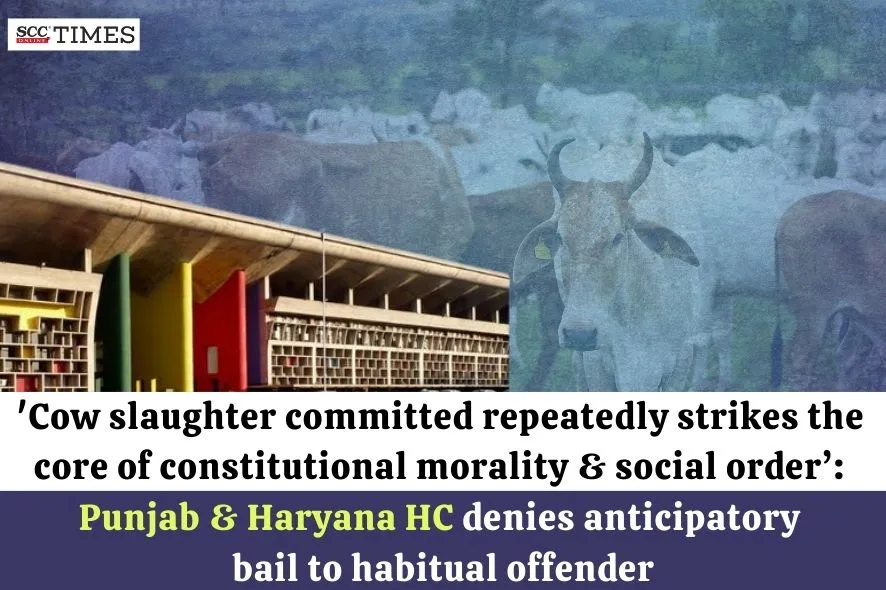Punjab and Haryana High Court: In a petition filed by the accused under Section 482 of the Bhartiya Nagarik Suraksha Sanhita, 2023 (‘BNSS’) seeking anticipatory bail in FIR under Section 13(2) of Haryana Gauvansh Sanrakshan and Gausamvardhan Act, 2015 and Section 11 of Prevention of Cruelty to Animals Act, 1960, a Single Judge Bench of Sandeep Moudgil J. denied the same due to the accused being a habitual offender with a likelihood of reoffending and grave nature of the allegations in the FIR.
The Court stated that Article 51A(g) of the Constitution encourages every citizen to show compassion to all living creatures, but the act of cow slaughter committed repeatedly, deliberately, and provocatively strikes at the core of constitutional morality and social order.
Background
In the present case, the secret informer of the Assistant Sub-Inspector who was on prevention of crimes prevention duty, informed that the accused along with others ran a business of cow slaughter. He informed that they were taking two cows from Haryana to Rajasthan for slaughtering. At the time of apprehension, theaccused was found seated in a canter vehicle wherein two cows were discovered tied with ropes, kept in deplorable condition, and without food, thereby giving rise to a strong suspicion of their involvement in activities relating to cow slaughter.
The accused contended that he was falsely implicated as no recovery was made from the petitioner. On the other hand, the respondent contended that the accused was apprehended from the place of occurrence and was actively involved in the commission of the alleged offence of cow slaughter.
Analysis and Decision
The Court considered the material placed on record and concluded that the accused was not a first-time offender as he was alleged to have previously been involved in three other FIRs relating to similar offences. The Court further noted that in those previous cases, the accused was granted the benefit of bail as a gesture of judicial trust, which was not respected but misused.
Further, the Court stated that the protection under Section 482 BNSS was not an open invitation for habitual offenders to escape the process of law. The Court explained that anticipatory bail is a discretionary relief, intended to protect innocent individuals from motivated or arbitrary arrest and not to provide sanctuary safeguard to those who repeatedly violated the law with impunity.
Considering that the present case carried emotional and cultural undertones due to the unique status of the cow in Indian society, the Court opined that it could not remain oblivious to the fact that in a pluralistic society like ours, certain acts, while otherwise private, might have severe repercussions on public peace when they offended the deeply held beliefs of a significant population group.
Further, the Court stated that Article 51A(g) of the Constitution encourages every citizen to show compassion to all living creatures, but the act of cow slaughter committed repeatedly, deliberately, and provocatively struck at the core of constitutional morality and social order.
The Court observed that it was conscious of the need to safeguard individual liberty but where such liberty was demonstrably misused, and where the accused’s conduct was indicative of recidivism, the law should respond with firmness. “The right to bail is not to be confused with the right to impunity”.
Further, the Court opined that the jurisprudence of bail, as has evolved through the courts, taught us to tread with caution to preserve liberty without compromising justice, order, and social equilibrium and the facts of the present case tilted the balance against the grant of protection under Section 482 of the BNSS and thus the Court was not inclined to invoke the same in favor of the accused because of his criminal antecedents and the grave nature of the allegations in the FIR concerned.
Considering the serious nature of the allegations involving offences of moral turpitude, coupled with the fact that the accused was a habitual offender, the Court held that there was no ground made out for grant of anticipatory bail. The Court dismissed the petition and stated that the possibility of the accused indulging in similar unlawful activities in the future, or tampering with the investigation, could not be ruled out.
[Aasif v. State of Haryana, 2025 SCC OnLine P&H 6143, decided on 5-8-2025]
Advocates who appeared in this case:
For the Petitioner: Rosi, Advocate



